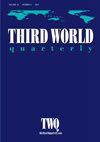除武器外的一切(EBA)计划与欧盟的规范困境——以缅甸服装行业为例
IF 1.8
2区 经济学
Q2 DEVELOPMENT STUDIES
引用次数: 0
摘要
本文章由计算机程序翻译,如有差异,请以英文原文为准。
The Everything But Arms (EBA) scheme and the EU’s normative dilemma: the case of Myanmar’s garment sector
Abstract Amid the escalation of the so-called Rohingya crisis and rising human rights concerns, EU institutions have repeatedly threatened a suspension of the Everything But Arms (EBA) trade arrangement with Myanmar, which is conditional on respect for fundamental human and labour rights. Despite Myanmar’s human rights situation having dramatically deteriorated, when in February 2021 the military seized power in a violent coup, the EU has failed to invoke a withdrawal of trade preferences. This article seeks to explore the rationale for the EU trade approach, which has so far received limited attention in the literature. By examining the case of Myanmar’s garment industry, which has been one of the most important sectors benefitting from EBA preferences, this article highlights the fact that, contrary to EU claims of a more assertive trade policy, EU trade decisions have been primarily influenced by normative dilemmas connected to the unwanted consequences of punishing trade instruments. In turn, the article shows that the EU’s normative dilemmas are paving the way for a targeted withdrawal of trade preferences.
求助全文
通过发布文献求助,成功后即可免费获取论文全文。
去求助
来源期刊

Third World Quarterly
DEVELOPMENT STUDIES-
CiteScore
4.10
自引率
15.00%
发文量
137
期刊介绍:
Third World Quarterly ( TWQ ) is the leading journal of scholarship and policy in the field of international studies. For almost four decades it has set the agenda of the global debate on development discourses. As the most influential academic journal covering the emerging worlds, TWQ is at the forefront of analysis and commentary on fundamental issues of global concern. TWQ examines all the issues that affect the many Third Worlds and is not averse to publishing provocative and exploratory articles, especially if they have the merit of opening up emerging areas of research that have not been given sufficient attention. TWQ is a peer-reviewed journal that looks beyond strict "development studies", providing an alternative and over-arching reflective analysis of micro-economic and grassroot efforts of development practitioners and planners. It furnishes expert insight into crucial issues before they impinge upon global media attention. TWQ acts as an almanac linking the academic terrains of the various contemporary area studies - African, Asian, Latin American and Middle Eastern - in an interdisciplinary manner with the publication of informative, innovative and investigative articles. Contributions are rigorously assessed by regional experts.
 求助内容:
求助内容: 应助结果提醒方式:
应助结果提醒方式:


